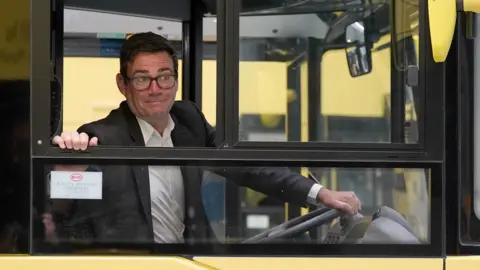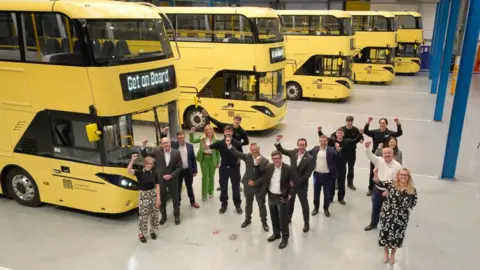Greater Manchester buses: First locally-controlled buses handed over
 PA Media
PA MediaThe first buses in Greater Manchester's new locally-controlled system have been handed over.
In September, the region will become the first area outside London to have a regulated bus system since privatisation in 1986.
Andy Burnham, mayor of Greater Manchester, officially received the first five buses for the new Bee Network.
"It was great to see the first ones off the production line," he said.
He also met apprentices involved in their production at the Larbert headquarters of Scottish bus builders Alexander Dennis.
Mr Burnham said their training exemplified "the far-reaching benefits of the work we are doing to improve public transport in Greater Manchester has [for] the UK economy".
He backed former prime minister Gordon Brown's call for mayors in all major Scottish cities, saying it would lead to more collaboration between businesses in both nations without the need for their governments.
 PA Media
PA MediaThe current deregulated bus system in Greater Manchester has been criticised for a lack of services and high ticket prices.
As part of the new Bee Network, 50 double-decker vehicles will start service in Wigan, Bolton and parts of Salford and Bury this September, when buses are brought under local control for the first time since 1986.
Another 50 buses will be delivered in March 2024 when the franchised services are rolled out to Bury, Rochdale and Oldham and parts of Manchester, Salford and Tameside.
Services in the rest of the region will come under local control in January 2025.
The electric buses will have two wheelchair bays, hearing induction loops, audio and visual announcement systems and anti-slip flooring.
About 500 buses will operate as part of the Bee Network by 2027, which will be funded by local and national government alongside the Stagecoach operator.
Transport for Greater Manchester said the vehicles would cut carbon emissions by 1.1 million tonnes and lead to a zero-emission bus fleet by 2032.
A representative said commuters would have a "much greater say over their services, with punctuality, reliability and complaints impacting what operators get paid".

Why not follow BBC North West on Facebook, Twitter and Instagram? You can also send story ideas to [email protected]
